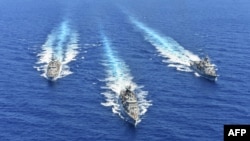Greece's navy has issued a code orange alert, advising battleships to surround a cluster of tiny islands in the southeast Aegean Sea and prepare for potential hostile action from Turkey. The dangerous standoff is further complicating efforts by the United States and the European Union to get the two sides to negotiate a maritime settlement.
Greece’s defense ministry on Wednesday released pictures of what Greek officials called a “protective wall,” illustrating what it called the severity of the looming standoff with Turkey.
Military officials tell VOA Greek gunboats circled the Kastellorizo and a number of uninhabited islands, in a move they said is meant to shield Greek territory against Turkish attempts to survey disputed waters for oil and gas.
Ankara redeployed the Oruc Reis survey ship earlier this month just weeks after it had recalled it from a similar mission that nearly brought Greece and Turkey to the brink of war over energy rights in the eastern Mediterranean.
U.S. and EU officials have since then been trying to get both sides to sit down and negotiate their differences.
But analysts say what makes this redeployment dangerous is that the Turkish vessel has come so close to the Greek coast.
The code orange alert was issued as the Oruc Reis sailed just 14 kilometers off the shores of Kastellorizo, the nearest any Turkish vessel has come to a Greek island during this standoff. The survey ship has since then been entering the contested zone, guarded by a formation of Turkish battleships and submarines.
More than 60 Greek ships are in the region monitoring the vessel's moves.
Ankara insists it is within its rights to survey the region for gas and oil. But Greek government officials like State Minister Giorgos Gerapetritis warn that any breach of Greek sovereignty will be met with force.
He says Greece will never allow any illegal drilling to take place and it will never relinquish its sovereign rights to exploit the seabed as far as 19 kilometers s from the coast of Greek islands.
NATO allies Greece and Turkey have long been at odds over conflicting oil and sea rights. Athens is now trying to convince the EU member states to stop selling arms to Turkey. It also wants to impose sanctions on Turkey – a bid that Germany and others are strongly resisting.
Alexis Papachelas, managing editor and a commentator on defense and foreign policy at the Kathimerini newspaper in Athens, warns that the Greek navy buildup marks an escalation of tensions that could be playing into Turkey’s hands.
He says this is an ongoing war of nerves and the biggest fear is for the Greek side to fall in the trap of escalating tension, he says. That’s exactly what Ankara wants right now in order to pin the blame on Greece.
The Oruc Reis is expected to complete its survey later this week but observers say it may get orders to stay longer to explore for oil and gas – something that could prolong the tensions.





